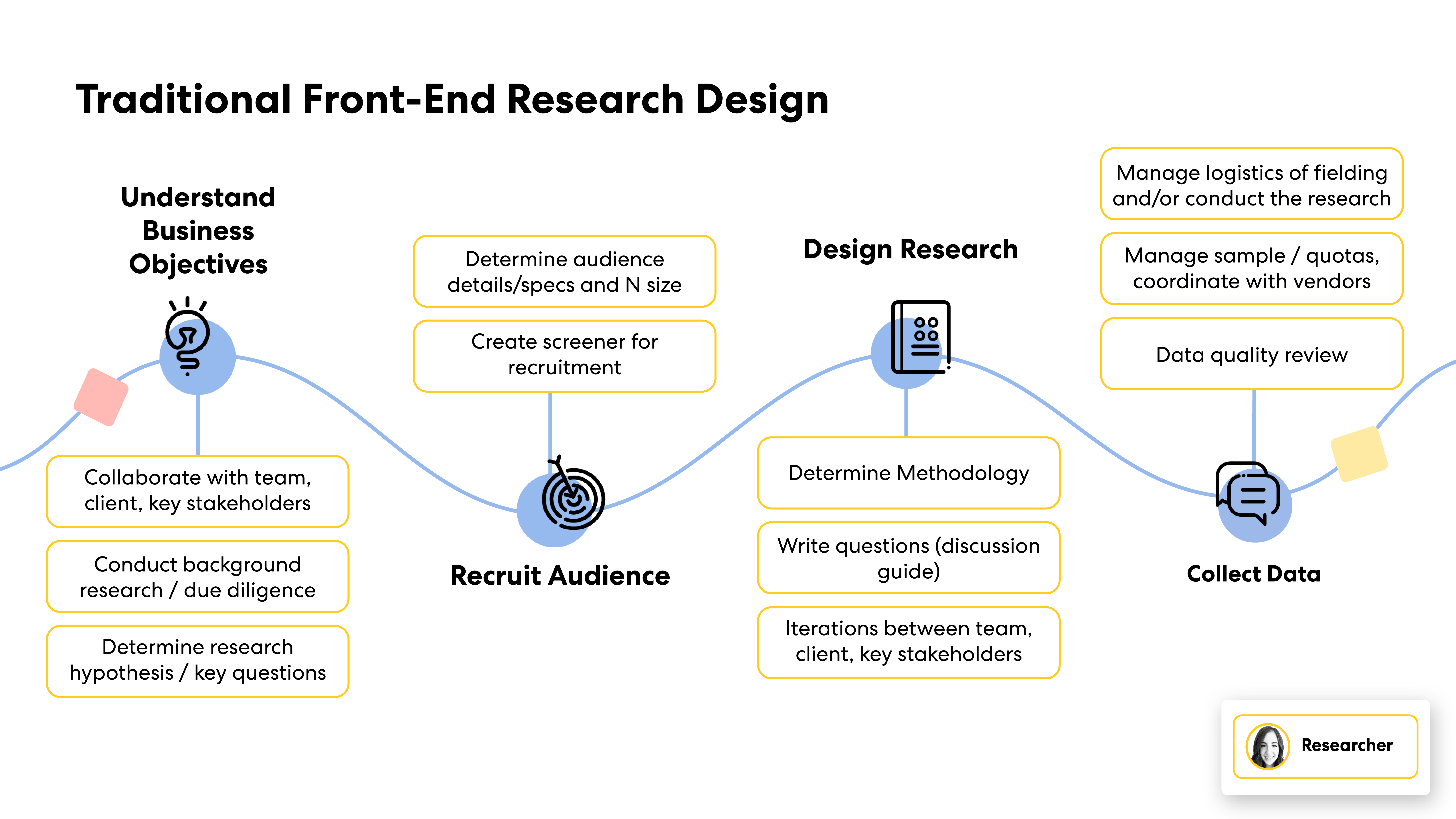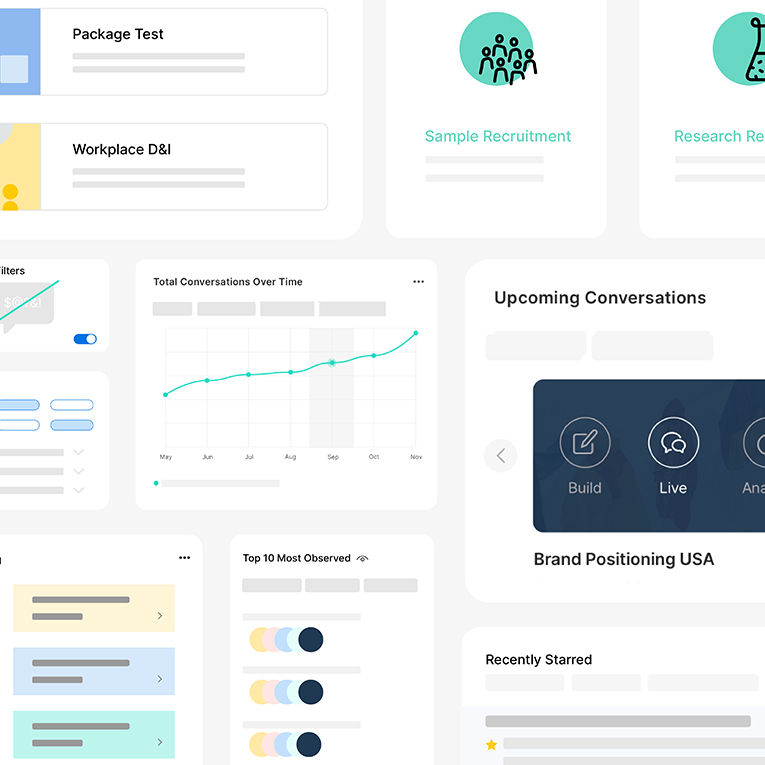.webp)
Trends
How to Calculate Your Sample Size Using a Sample Size Formula

.png)

.png)
Read More

.png)
.png)
.png)
Maria Noesi
November 25, 2021
.webp)
.webp)
.webp)
.webp)
.webp)
The Power of Generative AI in Front-End Research Design
Explore how Generative AI can make each step of your front-end qualitative research design easier and better.

In the fast-paced world of research and innovation, staying ahead of the curve is essential for success. As researchers, our role in shaping the trajectory of a project is paramount. However, with increasing complexity and the demand for faster results, Artificial Intelligence (AI) can be leveraged to make the process a little easier and better overall.
In this blog post, we’ll explore how AI can become a helpful assistant specifically in your front-end qualitative research design process.
Let’s take a look at the traditional front-end research design process (without the assistance of AI). This phase lays the foundation for any qualitative study. Here, researchers set business objectives, recruit their target audience, identify key questions, and determine their data collection method.

Throughout this process, AI offers a treasure trove of possibilities to streamline tasks and enhance accuracy. Let's dive in and discover how AI can be our trusted ally in transforming each step of front-end research into a more efficient and insightful endeavor.
- Understand Business Objectives: Using generative AI tools like ChatGPT, researchers can summarize background research done in the due diligence phase and validate or challenge hypotheses. This virtual assistant helps answer critical questions like whether they are on the right track or not.
- Recruit Audience: By inputting audience specifications into AI tools, researchers can generate a draft of screener questions to start from, saving significant time and effort. This process provides a starting point for a document and streamlines the recruitment process.
AI can also assist in determining the appropriate audience size for the study. Instead of manually sifting through census data or other sources, researchers can prompt AI-powered programs with relevant questions to estimate the ideal audience size. - Design Research: An essential aspect of research design involves formulating clear and effective questions, which serve as the foundation for your discussion guide. AI-powered tools can help vet your questions before going through iterations with your team, your client, and stakeholders. It can also help you at the end of the process to give a final check. Wondering how this works? Stay with us — we’ll dig into a specific case study soon.
- Collect Data: During data quality review, where we weed out bad data or bots, or fraudulent participants. AI-based techniques, including machine learning (ML) strategies, have the capacity to scrutinize vast amounts of data and pinpoint trends and inconsistencies that could potentially be a sign of fraudulent participants
As you can see, AI can be layered on to the process you already follow to make things better and easier. Here’s a look at that same process with the supplementation of AI tools.

These tools can help most of us, but can be especially helpful for junior researchers, leaner teams, times when your support might be lacking, or for anyone looking to have a virtual AI assistant or virtual set of eyes checking over your work. Incorporating these powerful tools into your research arsenal promises to elevate productivity and ensure a seamless journey toward uncovering valuable insights.
Real-Life Example: How Researchers Use AI to Write Better Questions
In the world of research, qualitative inquiries often demand custom questions tailored to the uniqueness of each project. However, crafting the perfect question can be a daunting task, and a poorly phrased one may lead to compromised data and hindered research outcomes. But what if there was a tool that could act as your research ally, efficiently guiding you toward optimal question formulation? A tool like Discussion Guide Suggestions: Remesh’s AI-powered solution is designed to enhance the question-writing process in research.
Here's an example that illustrates this new capability: A researcher is conducting a conversation to determine how people feel about the economy. They ask the open-ended question:
“Do you feel good about the economy?”
The responses received are all over the place and there are a lot of simple “yes/no” responses. It’s difficult to extract value. The question not only consumed valuable time for the researcher and participants but also drained the brand's resources without yielding insightful outcomes.
This is where Generative AI can step in and be the capable assistant we all want on our teams. AI-powered Discussion Guide Suggestions act as a scrutineer, evaluating questions for:
- clarity
- coherence
- effectiveness
In this example, the tool suggests an alternative option:“How would you describe your sentiment towards the current economy?” You can also see the rationale behind it and choose to accept or reject the suggestion.

Discussion Guide Suggestions prevent poor-quality questions from being asked to avoid wasting participant time and prevent gaps in your data post-collection. If you’re familiar with the popular tool Grammarly, it’s similar to that — it's not writing anything for you; it's suggesting ways to improve based on your own input. And then the tool leaves it to you to decide whether to take the suggestion or to leave it as it was.
Generative AI has already made its mark in research analysis, but its potential goes beyond that, and we’re just scratching the surface. By leveraging Generative AI in front-end research design, researchers can focus more on generating valuable insights and less on time-consuming manual tasks.

Want to dive deeper into the possibilities of AI in your research journey? Catch our on-demand webinar at GreenBook with CTO Dan Reich and Research Consultant Ali Key. They share how today’s leading researchers are leveraging AI for various stages of the research process.
And if you want to explore how Remesh’s AI-powered tools could enhance your workflow, request a demo — your path to greater work and better efficiency awaits!
More

Remesh Evolution: AI-Powered Insights Platform Unveils Major Updates to Satisfy Market Demand for High-Quality, Human-Centric Research

.png)

.png)
Read More

.png)
.png)
.png)

.png)

.png)
Learn More

.png)
.png)
.png)


Stay up-to date.
Stay ahead of the curve. Get it all. Or get what suits you. Our 101 material is great if you’re used to working with an agency. Are you a seasoned pro? Sign up to receive just our advanced materials.



